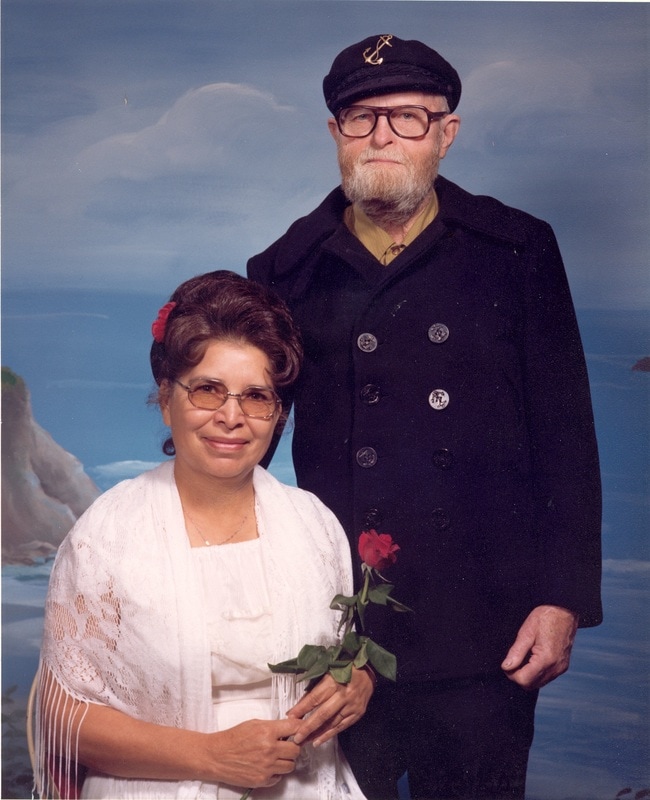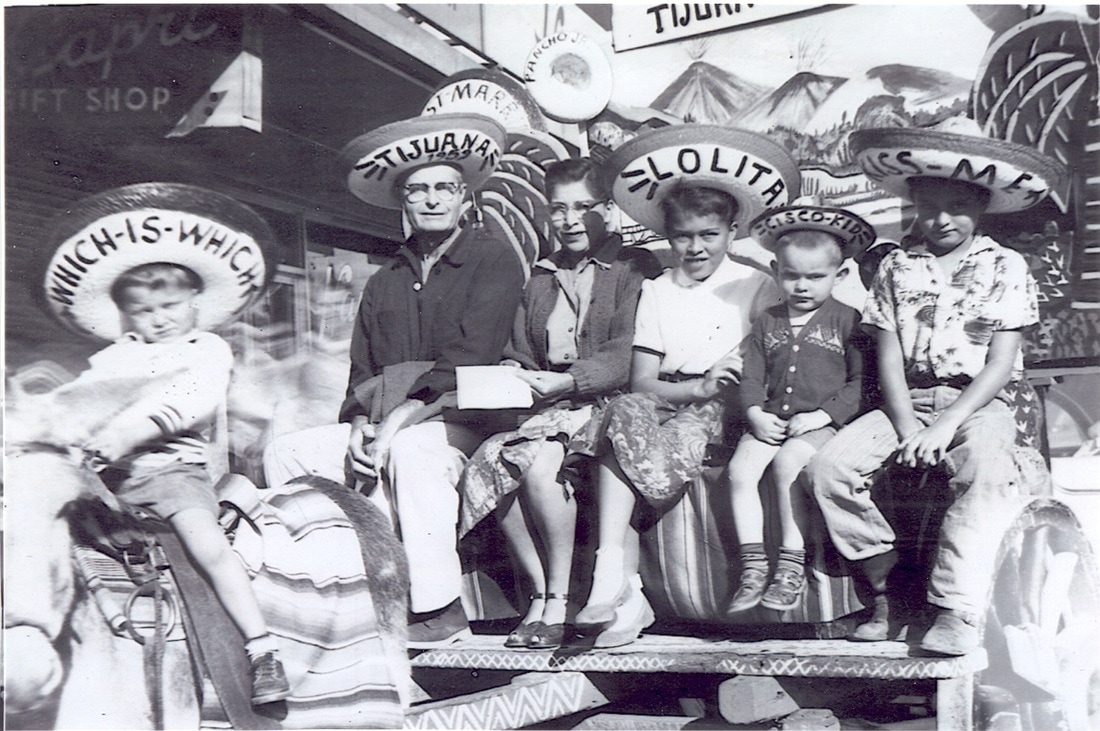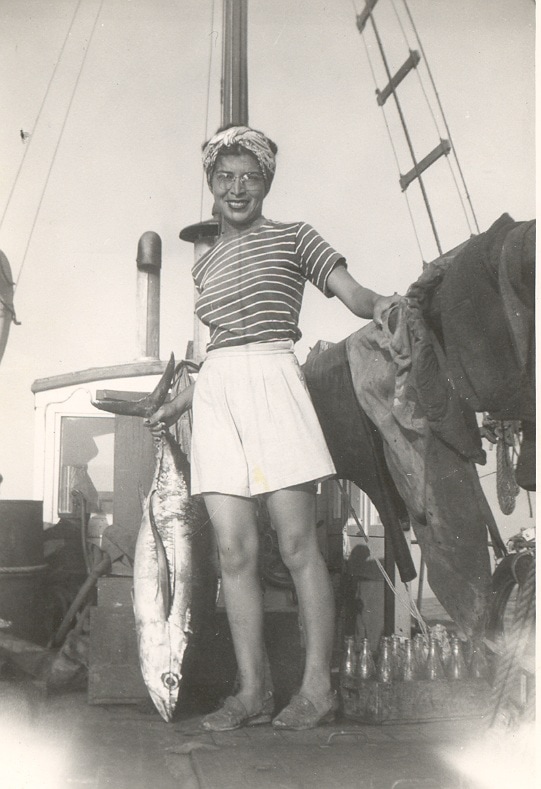Mama’s parents immigrated from Mexico in the early part of the twentieth-century. My grandfather, Teodoro Pantoja, ran from a father who put a price on his head. Wanted, dead or alive.
Roberta Ayala, my grandmother, came to the US during the Mexican Revolution. Actually, the family has two stories about how she got here, but I prefer this one. She was thirteen and from a wealthy family when the Zapatistas confiscated their property. Her family headed north in a wagon with what valuables they could carry.
They were stopped at the border because the US didn’t want to be overrun by refugees. (Haven’t I heard this somewhere before?). While in a refugee camp, the entire family contracted typhoid fever and only grandma survived. She was taken in by another family and eventually made her way to Southern California.
Teodoro didn’t allow English to be spoken in his home. When mama started school, she didn’t speak a word of English. When she came home with stories of Pilgrims and American History, Grandpa said, “Mierda. You don’t need to know gringo history. You only need to know Mexican History.” So, he regaled the family with stories of Aztecs and Mayans. Of Conquistadores and La Melinche, of Father Madero and the fight to throw off Spanish rule, of Juarez and the fight to throw off French rule. These were the stories she grew up with.
Grandpa believed that at age thirteen, you became a man or a woman. It was your duty to go out into the world, get a job, and help support the family. When she was thirteen, Mama left school to work in the strawberry and tomato fields.
Her life in Southern California in the thirties was not much different from what her life would have been in Mexico. Then the world intervened.
Hitler invaded Poland and the world went to war. The men were all drafted, leaving their jobs at home unattended. The call went out to women to fill these jobs and help the war effort.
Mama, her sister and Abuelita (our pet name for Grandma), took jobs in a tuna cannery in Newport Beach. It was while working in the cannery that she met this big, strong Viking who swept her off her feet.
Papa was a commercial fisherman and took Mama to sea with him. Together, they ran one of the best boats in the fleet, what is called in fishing circles a “highliner.”
After the war, the fishing industry collapsed and they moved to Oregon in search of a way to make a living. Papa decided that they should open a Mexican restaurant because there was no competition.
We also didn’t have a clientele. The rough loggers and woodsmen in Oregon didn’t know anything about Mexican food. They told us that they wouldn’t eat it because it was “hot” and that they didn’t like “tay-cos.” Mama was the best marketer I have ever seen.
This uneducated Mexican woman built a business and started an industry practically by herself. When a customer who liked Mexican food wandered into our restaurant with his friends in tow, he would order tacos or enchiladas, but the friends wanted hamburgers.
Mama said, “I tell you what. Let me order for you. If you don’t like the food, I’ll serve you a steak at no charge.” Hundreds of people took her up on her offer and never once in more than thirty years did she have to give away a steak dinner.
Mama was always there for me when I was a little boy, but we really bonded when we opened El Sombrero. I was thirteen at the time. I spent the summer working beside Papa, converting the campus malt shop on the University of Oregon campus into a Mexican restaurant. Finally, in mid-September, we were ready to open.
Papa wanted a big grand opening. Advertising, a band, flyers and banners. Mama put her foot down. “No. We’re going to slide quietly into business. We’ll open before school starts so we can work the bugs out before the students come back.” The decision was made. We would open on a Saturday, two weeks before school started.
Papa and I got there early. We started a pot of beans cooking and he started making soup. I chopped lettuce and prepared the steam table and cold line. Mama came in later with a big smile on her face wearing a peasant blouse and colorful Mexican skirt.
At eleven o’clock we unlocked the doors… and nothing happened. There wasn’t a crowd waiting outside the door bustling to get in.
At around noon, a young couple wandered in, then a professor, then a single girl. Our lunch rush on that first day consisted of four people. Since business was so slow, Mama sent our waitress home.
After an hour or so of standing around in the kitchen, Papa threw in the towel. “Listen, Vicki, I still have several things to finish up on the construction. I need to run out to Jerry’s and get more plywood. I’ll be back in time for dinner.
That left Mama and me alone, running the restaurant, Mama in the front of the house, me the only cook in the kitchen. Did I mention that I was thirteen years old and had never worked a day in a restaurant before?
Mama took the orders and hung them on the wheel for me to make. What the heck was I going to do? I knew how to roll an enchilada or make a taco, but here were people paying for authentic Mexican food. What did I know?
While I was putting the first order in the pass-through window, Mama hung four more orders. I looked into the dining room to see every table full.
I worked as fast as I could, putting orders in the pass through and reading tickets. Occasionally, I looked out into the dining room. Every table was full. There were people standing in the open doorway. There were people outside the doorway. They formed a line wrapping around the block.
I panicked.
I threw off my apron and ran for the back door. As I put my hand on the knob, I felt a hand grabbing my shirt collar.
“Don’t you leave me now,” Mama growled.
She pulled me back into the kitchen. “Get back to work. We have to serve these people. We don’t have any choice.”
I tied on my apron and walked back to the order wheel. I pulled down the next ticket and began to work. Then something miraculous happened. I worked on the second ticket while the first was in the oven. Soon I was three, then four orders ahead. The food flew out of the pass-through window, every plate a masterpiece.
I was so enthralled in my part of the operation, I never stopped to think what Mama must be going through. Here she was, alone in the dining room with a hundred hungry guests, more people standing around the door, more in lines going around the block. How did she keep her head together and how in the hell did she ever serve those people?
I don’t know where time went. I just kept pushing out the food. As soon as I pulled a ticket down another one took its place. Mama would put three or four tickets together on one clip when the wheel was full. I just went on. Oblivious to the world around me.
Then it happened! I put an order in the window and reached for the next ticket, but there was no next ticket. I stopped to breathe. Mama was still running around in a room full of people, but I had no more orders. I slipped around the counter and went into the service area to grab a Fresca. Mama grabbed me.
“Penn, get a pitcher of water and a pot of coffee and walk around the tables refilling people’s cups and glasses.”
I don’t know what I was thinking. I automatically followed her instructions. As I walked through the room, filling glasses, running to get more chips or salsa for a table, or taking an order for another taco or tamale, I had the time of my life.
I was performing. I was this different person. People asked me questions and I gave them humorous answers and the LAUGHED! I gave them directions, I took their money at the cash register and wished them well.
It was over, the restaurant emptied out. Mama collapsed into a booth with a Coke in her hand. She took off her shoes and rubbed her feet. I fell into the bench across from her. Suddenly, I was ravenously hungry.
Papa popped out of the kitchen. “I’m back. How did everything go?”
I thought Mama was going to grab a knife from the kitchen and kill him. “You left me here.”
We told him our story. “Where did all those people come from?” Mama asked.
Papa had a lame look on his face. “There’s a football game tonight. The University of California is up here to play the Ducks.”
Mama exploded. “A game? California? These people must be Californians. They came up here to watch their team and we’re the only Mexican restaurant in town.”
The students from Berkley were used to Mexican food. They were in a foreign town and found the only Mexican restaurant in a hundred miles.
Mama always learned from her mistakes. Never again did we get caught with our pants down. She always knew what was going on in town, when there was a big Broadway roadshow in town, when the County Fair was running.
Papa was never really enamored of the restaurant business. He came in the morning and made the soup and cooked the beans, but as soon as the lunch rush was over, he was out of there. I grew up going to the restaurant after school, sitting in a back booth and doing my homework.
When five o’clock rolled around, I put on my apron, checked the kitchen and worked the dinner shift six days a week.
The restaurant was a joint venture between Mama and me. Now, thirty years later, we still laugh about out adventures. I hope you did too.
Stay tuned. Next week, I’ll tell you more about El Sombrero and my amazing childhood.
In the meantime, thank you, Mama, for all you did for me.
Con Cariño, always.
Please drop me a line by using the “Contact Penn” tab and let me know what you think of this blog. Do you want to hear more of my El Sombrero stories? Enquiring minds want to know.



 RSS Feed
RSS Feed